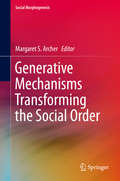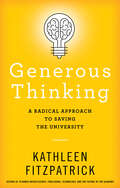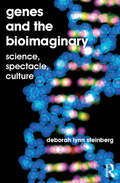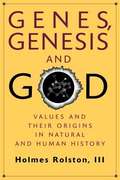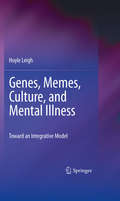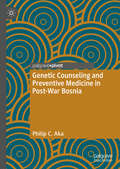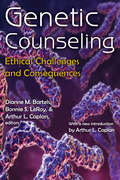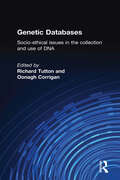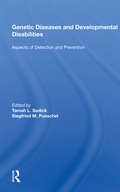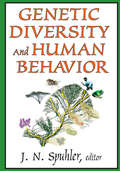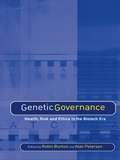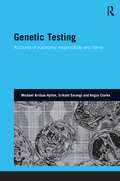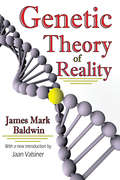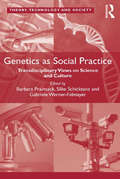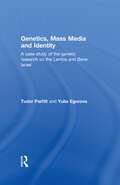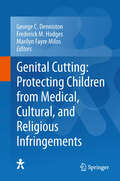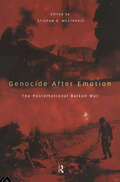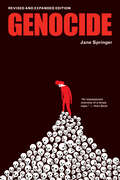- Table View
- List View
Generative Mechanisms Transforming the Social Order
by Margaret S. ArcherThis volume examines how generative mechanisms emerge in the social order and their consequences. It does so in the light of finding answers to the general question posed in this book series: Will Late Modernity be replaced by a social formation that could be called Morphogenic Society? This volume clarifies what a 'generative mechanism' is, to achieve a better understanding of their social origins, and to delineate in what way such mechanisms exert effects within a current social formation, either stabilizing it or leading to changes potentially replacing it . The book explores questions about conjuncture, convergence and countervailing effects of morphogenetic mechanisms in order to assess their impact. Simultaneously, it looks at how products of positive feedback intertwine with the results of (morphostatic) negative feedback. This process also requires clarification, especially about the conditions under which morphostasis prevails over morphogenesis and vice versa. It raises the issue as to whether their co-existence can be other than short-lived. The volume addresses whether or not there also is a process of 'morpho-necrosis', i. e. the ultimate demise of certain morphostatic mechanisms, such that they cannot 'recover'. The book concludes that not only are generative mechanisms required to explain associations between variables involved in the replacement of Late Modernity by Morphogenic Society, but they are also robust enough to account for cases and times when such variables show no significant correlations.
Generous Thinking: A Radical Approach to Saving the University
by Kathleen FitzpatrickCan the university solve the social and political crisis in America?Higher education occupies a difficult place in twenty-first-century American culture. Universities—the institutions that bear so much responsibility for the future health of our nation—are at odds with the very publics they are intended to serve. As Kathleen Fitzpatrick asserts, it is imperative that we re-center the mission of the university to rebuild that lost trust. Critical thinking—the heart of what academics do—can today often negate, refuse, and reject new ideas. In an age characterized by rampant anti-intellectualism, Fitzpatrick charges the academy with thinking constructively rather than competitively, building new ideas rather than tearing old ones down. She urges us to rethink how we teach the humanities and to refocus our attention on the very human ends—the desire for community and connection—that the humanities can best serve. One key aspect of that transformation involves fostering an atmosphere of what Fitzpatrick dubs "generous thinking," a mode of engagement that emphasizes listening over speaking, community over individualism, and collaboration over competition.Fitzpatrick proposes ways that anyone who cares about the future of higher education can work to build better relationships between our colleges and universities and the public, thereby transforming the way our society functions. She encourages interested stakeholders to listen to and engage openly with one another's concerns by reading and exploring ideas together; by creating collective projects focused around common interests; and by ensuring that our institutions of higher education are structured to support and promote work toward the public good. Meditating on how and why we teach the humanities, Generous Thinking is an audacious book that privileges the ability to empathize and build rather than simply tear apart.
Genes and the Bioimaginary: Science, Spectacle, Culture
by Deborah Lynn SteinbergGenes and the Bioimaginary examines the dramatic rise and contemporary cultural apotheosis of 'the gene'. The book traces not only the genetification of modern life but is also a journey through the complex relationship between science and culture. At the heart of this book are three interlinked questions. The first concerns the paradigmatic transformations of the 'genetics revolution': how can we understand the impact of genes on social arenas as diverse as law and agriculture, politics and medicine, genealogy and jurisprudence? Second, how has the language of genes come to pervade public discourse - as much a trope of personal narrative as of the popular imaginary? And third, how can we gain critical purchase not only on the conditions and consequences of a particular science, but on its projective seductions, the terms of its persuasion, and the dilemmas and anxieties provoked in its wake? Through a series of illuminating case studies ranging from 'gay genes' to 'Jew genes', to genes for crime; from CSI to the Innocence Project, from genetics (post)racial imaginary to its phantasies of redemption, the book examines the emergence of the gene as a pre-eminent locus of both scientific and social explanation, and as a powerful object of spectacle, projective phantasy and attachment. Genes and the Bioimaginary makes a distinctive contribution to our understanding of how knowledge comes to be not only powerful, but plausible.
Genes, Genesis, and God: Values and Their Origins in Natural and Human History
by Holmes Rolston IIIHolmes Rolston challenges the sociobiological orthodoxy that would naturalize science, ethics, and religion. The book argues that genetic processes are not blind, selfish, and contingent, and that nature is therefore not value-free. The author examines the emergence of complex biodiversity through evolutionary history. Especially remarkable in this narrative is the genesis of human beings with their capacities for science, ethics, and religion. A major conceptual task of the book is to relate cultural genesis to natural genesis. There is also a general account of how values are created and transmitted in both natural and human cultural history. The book is written by one of the most well-respected figures in the philosophy of biology and religion.
Genes, Memes, Culture, and Mental Illness
by Hoyle LeighWhat produces mental illness: genes, environment, both,neither? The answer can be found in memes--replicable units of information linking genes and environment in the memory and in culture--whose effects on individual brain development can be benign or toxic. This book reconceptualizes mental disorders as products of stressful gene-meme interactions and introduces a biopsychosocial template for meme-based diagnosis and treatment. A range of therapeutic modalities, both broad-spectrum (meditation) and specific(cognitive-behavioral), for countering negative memes and their replication are considered, as are possibilities for memetic prevention strategies. In this book, the author outlines the roles of genes and memes in the evolution of the human brain; elucidates the creation, storage, and evolution of memes within individual brains; examines culture as a carrier and supplier of memes to the individual; provides examples of gene-meme interactions that can result in anxiety, depression, and other disorders; proposes a multiaxial gene-meme model for diagnosing mental illness; identifies areas of meme-based prevention for at-risk children; and defines specific syndromes in terms of memetic symptoms, genetic/ memetic development, and meme-based treatment.
Genese und Rezeption der Theorie der kategorialen Bildung von Wolfgang Klafki
by Manuel HermesWolfgang Klafki ist einer der zentralen deutschen Erziehungswissenschaftler in der zweiten Hälfte des 20. Jahrhunderts. Seine 1959 publizierte Dissertation über "Das pädagogische Problem des Elementaren und die Theorie der kategorialen Bildung" etablierte ihn mit einem Schlag in der ersten Riege der Erziehungswissenschaft der jungen Bundesrepublik. Weitgehend unbekannt ist bis heute, dass und inwiefern er seine Theorie der kategorialen Bildung bereits in der erst 2013 veröffentlichten Staatsexamensarbeit von 1951 ausgearbeitet hat. Die Studie von Manuel Hermes nimmt ihren Ausgang von jener frühesten Arbeit Klafkis und zeichnet von dort aus die Genese der Theorie der kategorialen Bildung in ihrer ursprünglichen Entstehung und werkimmanenten Entwicklung von 1951 bis 2007 nach. Im Anschluss daran untersucht Hermes die erziehungswissenschaftliche und didaktische Rezeption der Theorie der kategorialen Bildung. Er legt damit ein unverzichtbares Standardwerk für jede künftige Forschung zum Thema vor.
Genetic Counseling and Preventive Medicine in Post-War Bosnia
by Philip C. AkaGenetic Counseling and Preventive Medicine in Post-War Bosnia offers a unique new perspective to longstanding debates on healthcare reforms in Bosnia. In this penetrating analysis, Philip C. Aka argues that twenty-five years after the ethnic war that shook Bosnia and Herzegovina to its foundations, healthcare reforms are a function of preventive medicine, defined as genetic counselling, backed by tobacco and alcohol control. At its core, the book offers a fresh examination of healthcare reforms in Bosnia set in the multidisciplinary field of bioethics, supplemented by comparative health studies, and comparative human rights. By offering an extensive list of electronically accessible literature on healthcare accessible in the public domain, Aka delivers an exemplar of research possibilities in the Information Age.
Genetic Counseling: Ethical Challenges and Consequences
by Dianne M. Bartels Arthur L. Caplan Bonnie S. LeRoyGenetic counseling is fairly new. The fact that the field is an accepted professional enterprise in universities, clinics, and hospitals throughout the United States is remarkable. The contributors argue that genetics and medicine rest on beliefs widely held in American society. Scientific progress is good, and highly sophisticated technologies are appropriate means to solving medical problems. The better understanding they gain about the nature and evolution of disease, the more prepared clinicians will be to treat and prevent future occurrence of disease. A belief that medicine, including genetic medicine, is clear, factually based, and objective undergirds the strategies and norms of genetic counseling. This collection of original papers explores the history, values, and norms of that process, with focus on the value of non-directiveness in counseling practice. The contributors' examination of genetic counseling issues serves as a foundation from which to address the ethical, legal, and policy considerations of clinical genetics.
Genetic Databases: Socio-Ethical Issues in the Collection and Use of DNA
by Richard Tutton Oonagh CorriganGenetic Databases offers a timely analysis of the underlying tensions, contradictions and limitations of the current regulatory frameworks for, and policy debates about, genetic databases. Drawing on original empirical research and theoretical debates in the fields of sociology, anthropology and legal studies, the contributors to this book challenge the prevailing orthodoxy of informed consent and explore the relationship between personal privacy and the public good. They also consider the multiple meanings attached to human tissue and the role of public consultations and commercial involvement in the creation and use of genetic databases. The authors argue that policy and regulatory frameworks produce a representation of participation that is often at odds with the experiences and understandings of those taking part. The findings present a serious challenge for public policy to provide mechanisms to safeguard the welfare of individuals participating in genetic databases.
Genetic Diseases And Development Disabilities: Aspects Of Detection And Prevention
by Tamah L SadickAdvances in medical genetics during the past two decades have made possible the detection and prevention of many genetic disorders and developmental disabilities. The emphasis of this book is on the application of these new developments to real-life situations. Covering homozygote newborn screening, heterozygote detection in the community, and pren
Genetic Diversity and Human Behavior
by J.N. SpuhlerGenetic differences in humans, like those between individuals of any animal or plant species and those between species, are all products of the evolutionary development of the living world. These differences, with their behavioral consequences, can only be understood in the light of evolution. Our understanding of evolution, however, has itself evolved. The Darwin- Wallace theory of evolution appeared in the nineteenth century. Since then, development of evolutionary thought has gone through several stages. The contributions in this volume describe those stages.
Genetic Governance: Health, Risk and Ethics in a Biotech Era
by Alan Petersen Robin BuntonEthical and practical issues around genetic research are of major international concern, both in academia and in the public domain. Questions concerning what interventions are possible and appropriate with the increasing amount of genetic information available, challenge our understandings of ourselves, our health and wellbeing, and the role of medical ethics, public health, surveillance and risk. However there has been little reflection on the socio-political effects of this new genetic knowledge and the changes in practice that are currently impacting on our lives.Containing contributions from key international researchers, this book examines the broader issues of genetic debates and looks at how prediction and risk assessment is being changed in the arenas of health, medicine and reproduction, bringing new insight on the dangers of surveillance, regulation and increased inequality. Developed out of the Taylor and Francis journal Critical Public Health, the book considers the implications of developments in genetics for contemporary liberal governance, as well as for the future of healthcare and public health.
Genetic Testing: Accounts of Autonomy, Responsibility and Blame (Genetics and Society)
by Srikant Sarangi Michael Arribas-Ayllon Angus ClarkeAdvances in molecular genetics have led to the increasing availability of genetic testing for a variety of inherited disorders. While this new knowledge presents many obvious health benefits to prospective individuals and their families it also raises complex ethical and moral dilemmas for families as well as genetic professionals. This book explores the ways in which genetic testing generates not only probabilities of potential futures, but also enjoys new forms of social, individual and professional responsibility. Concerns about confidentiality and informed consent involving children, the assessment of competence and maturity, the ability to engage in shared decision-making through acts of disclosure and choice, are just some of the issues that are examined in detail.
Genetic Theory of Reality: Being The Outcome Of Genetic Logic - Scholar's Choice Edition
by Jaan Valsiner James Mark BaldwinJames Mark Baldwin left a legacy that has yet to be fully examined, one with profound implications for science and the humanities. In some sense it paralleled that of his friend Charles Sanders Peirce, whose semiotics became understood only a century later. Baldwin was trying to make sense of complex biological and social processes that only now have come into the limelight as biological sciences have re-emerged in psychology. Baldwin's focus on development, based on the observation of his own children and extrapolated to his general theoretical scheme, is fully in line with where contemporary biological sciences are heading. This is exemplified by the bounded flexibility of the work of the genetic system. The general principle of persistent exploration of the environment with the result of creating novelty, which was the core of Baldwin's theoretical system, has since the 1960s become the guiding idea in genetics. Contemporary developmental science is rooted in Baldwin's thinking. In his new introduction, Jaan Valsiner shows that Baldwin's Genetic Theory of Reality demonstrates how human beings are in their nature social beings, establishes an alternative conceptualization of evolutionary theory, and formulates a system of developmental logic, all of which serve as the foundation for developmental psychology as a whole. This is a work of social science rediscovery long overdue.
Genetics and Society: A Sociology of Disease
by Anne KerrGenetic science has advanced rapidly in recent years; things happen now that might have seemed like science fiction only ten years ago. Genetics and Society looks at the history of this science and the wide-ranging impact it has had on contemporary society. Using fascinating and cutting-edge examples throughout, Anne Kerr examines topics as diverse as: the institutional structures that have grown up around the diagnosis and treatment of genetic disorders the media representation of genetic debates from designer babies to the genetic sources of alcoholism the politics of genetic decision-making and the state regulation of both genetic research and the biomedicine industry. Each chapter begins with a summary and a definition of key terms and ends with annotated notes on further reading, meaning that it is as accessible for the layman as it is for the scientist. The resulting student-friendly text will be essential reading for anybody with an interest in genetic science and the impact it is having on society.
Genetics as Social Practice: Transdisciplinary Views on Science and Culture (Theory, Technology And Society Ser.)
by Barbara Prainsack Silke Schicktanz Gabriele Werner-FelmayerRecent debate about the ethical and regulatory dimensions of developments in genetics has sidelined societal and cultural aspects, which arguably are indispensable for a nuanced understanding of the complexities of the topic. Regulatory and ethical debates benefit from taking seriously this ’third dimension’ of culture, which often determines the configurations and limits of the space within which scientific, ethical and legal debate can take place. To fill this gap, this volume brings together contributions exploring the mutual relationships between genetics, markets, societies and identities in genetics and genomics. It draws upon the recent transdisciplinary debate on how socio-cultural factors influence understandings of ’genetics2.0' and shows how individual and collective identities are challenged or reinforced by cultural meanings and practices of genetics. This book will become a standard reference for everyone seeking to make sense of the controversies and shifts in the field of genetics in the second decade of the twenty-first century.
Genetics, Mass Media and Identity: A Case Study of the Genetic Research on the Lemba
by Tudor Parfitt Yulia EgorovaThis is the first book to explore the effect of genetic research on the Lemba Judaising community of Southern Africa and the phenomenon of Israelite identity. The science of genetics as relayed by the media is perceived by laymen as being irreproachably objective 'hard science': its disinterested 'scientific' findings appear immensely impressive and may therefore act as a powerful catalyst for change. In this case, an oral tradition cherished by many of the Lemba that they are of Jewish origin appears to be supported by recent DNA testing, which has deeply affected the narrative and religious identity of the group and the way the tribe is perceived in the Western world. International in appeal, this topical text brings together cutting-edge research on the social, cultural and ethical implications of genetics and the study of Judaising movements across the world. This book will be of interest to researchers and students of Jewish history, genetic anthropology, race and ethnicity studies, and religious and cultural studies.
Geniale Frauen in der Wissenschaft: Versteckte Beiträge, die die Welt verändert haben
by Lars JaegerObwohl Frauen schon früh das wissenschaftliche Denken mitgeprägt haben, sichtbar geworden sind sie fast nie. Dieses Ungleichgewicht setzt sich bis heute fort, auch wenn es aktuell weit mehr Wissenschaftlerinnen gibt als jemals zuvor. Lars Jaeger spannt einen Bogen von der Antike bis heute und porträtiert in essayartigen Einführungen das Leben und Wirken der wohl bedeutendsten weiblichen Naturwissenschaftlerinnen und Mathematikerinnen. Von Hypatia von Alexandria über Émilie du Châtelet und Emmy Noether bis hin zu Lisa Randall, sie alle haben Großes geleistet, die Wissenschaft entscheidend vorangebracht und konnten dennoch oft nicht aus dem Schatten ihrer männlichen Kollegen treten.Neben den spannenden Porträts der einzelnen Wissenschaftlerinnen sowie einer detaillierten und anschaulichen Darstellung ihrer wissenschaftlichen Leistungen beleuchtet dieses Sachbuch auch das Geschlechterverhältnis in der Wissenschaft, das sich nur quälend langsam zugunsten eines fairen Verhältnisses für die Frauen entwickelt.
Geniale Prinzipien der Natur: Rechnen wir mit der Natur oder die Natur rechnet mit uns [ab]
by E. W. KüppersDieser Band legt den Schwerpunkt auf praktische Anwendungen der Prinzipien, die aus der Natur in unserem Gestaltungsraum übertragen werden können. Er ist dabei getragen von den Regelungs- und Steuerungssystemen, wie sie die Wissenschaft der Kybernetik beschreibt.
Genital Cutting: Protecting Children from Medical, Cultural, and Religious Infringements
by Frederick M. Hodges Marilyn Fayre Milos George C. DennistonThis volume contains the proceedings of the 10th International Symposium on Circumcision, Genital Integrity, and Human Rights. Authors are international experts in their fields, and the book contains the most up-to-date information on the issue of genital cutting of infants and children from medical, legal, bioethical, and human rights perspectives.
Genocide after Emotion: The Post-Emotional Balkan War
by Stjepan G. MeštrovićThe failure to adequately respond on the part of the major Western superpowers to the atrocities in the Balkans constitutes a major moral and political scandal. In Genocide after Emotion Mestrovic and the contributors thoroughly interrogate the war, its media coverage and response in the West. The result is alarming, both for the progress of the war and for the condition of our society today: the authors argue that the West is suffering from a "postemotional" condition - we are beyond caring about anything anymore.
Genocide and Mass Violence
by Devon E. Hinton Alexander L. HintonWhat are the legacies of genocide and mass violence for individuals and the social worlds in which they live, and what are the local processes of recovery? Genocide and Mass Violence aims to examine, from a cross-cultural perspective, the effects of mass trauma on multiple levels of a group or society and the recovery processes and sources of resilience. How do particular individuals recall the trauma? How do ongoing reconciliation processes and collective representations of the trauma impact the group? How does the trauma persist in 'symptoms'? How are the effects of trauma transmitted across generations in memories, rituals, symptoms, and interpersonal processes? What are local healing resources that aid recovery? To address these issues, this book brings into conversation psychological and medical anthropologists, psychiatrists, psychologists and historians. The theoretical implications of the chapters are examined in detail using several analytic frameworks.
Genocide and its Threat to Contemporary International Order: Consent And The Controlled Body (New Security Challenges)
by A. GallagherFor far too long the discipline of International Relations has failed to engage with the study of genocide. This is despite the fact that genocide holds a direct relationship with the central concepts of international relations: the state, war, power, and security. This bold, innovative and unique book sets out to tackle this by bringing the concept of genocide into the discipline of IR, via the English School, in order to theorise the relationship between genocide, justice, and order. Drawing on a wide-range of primary and secondary interdisciplinary material from International Relations, Genocide Studies, Security Studies, International Law, History, Politics and Political Theory, this book aims to understand genocide within the context of International Relations and the implications that this has on policymaking. Gallagher identifies the obstacles and challenges involved in bringing the study of genocide into IR and uniquely analyses the impact of genocide on the ordering structure of international society.
Genocide: Key Themes
by A. Dirk Moses Donald BloxhamThe growth of scholarship on the pressing problem of genocide shows no sign of abating. This volume takes stock of Genocide Studies in all its multi-disciplinary diversity by adopting a thematic rather than case-study approach. Each chapter is by an expert in the field and comprises an up-to-date survey of emerging and established areas of enquiry while highlighting problems and making suggestions about avenues for future research. Each essay also has a select bibliography to facilitate further reading. <p><p>Key themes include imperial violence and military contexts for genocide, predicting, preventing, and prosecuting genocide, gender, ideology, the state, memory, transitional justice, and ecocide. The volume also scrutinizes the concept of genocide - its elasticity, limits, and problems. It does not provide a definition of genocide but rather encourages the reader to think critically about genocide as a conceptual and legal category concerned with identity-based violence against civilians.
Genocide: Revised and Expanded Edition (Groundwork Guides)
by Jane SpringerWhat is genocide? Why does it happen? What can be done to prevent it from happening again? At the end of the Second World War, with the establishment of the United Nations, the holding of the Nuremberg Trials and the adoption of the Genocide Convention, the international community assured itself that genocide would never happen again. But never again has become a meaningless phrase. This book asks why. It also asks, what is genocide? Where has it happened in the past? Who is being threatened by genocide today? And what can we do to prevent this terrible crime from recurring? Providing an overview of the history of genocide worldwide, this revised, expanded edition helps readers answer these questions. It brings them up to date with recent events—the killing of the Rohingya in Myanmar, the persecution of the Uyghurs in China, the broader recognition of the genocide of Indigenous Peoples, the resurgence of fighting in Darfur, and the wars in Ukraine and the Middle East. It examines and elucidates the debates and controversies surrounding the use of the term genocide as well as the reasons for the common response by individuals, governments and the United Nations — denial. Key Text Features annotated resources chapters definitions explanation facts further information further reading headings historical context illustrations index map sidebars table of contents timeline
